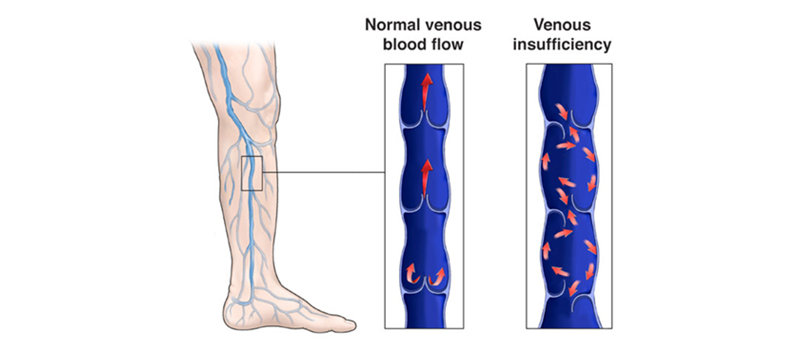Chronic Venous Insufficiency
Chronic Venous Insufficiency (CVI) happens when the functioning of the venous wells and or the valves in the leg veins is damaged. As a result, blood does not flow back to the heart from the legs. In normal circumstances, there is continuous blood flow between the legs and the heart. As per the Society of Vascular Surgery, it affects about 40 % of the American population.

Valves play a crucial role in preventing blood backflow to the legs. In CVI, they are damaged and cannot perform their function properly. As a result, blood does not get to the heart; instead, it stays in the vein increasing blood pressure and leading to CVI.
The most common causes of CVI are blood clots happening in the deep veins of the legs, in a condition called Deep Vein Thrombosis. Other causes of CVI include;
- Vascular malformations
- Pelvic tumors
- Varicose veins
- Weakness in the leg muscles that aid the squeezing of blood upwards to the heart
- At times CVI occurs for unknown reasons.
Symptoms of Chronic Venous Insufficiency
- Swelling in the ankles and legs
- Varicose veins
- Brown-colored skin around the ankles
- Leg and muscle cramps which could be painful
- You feel pain when you are walking, and it stops when you rest
- Tightness in your calves and pain in the legs
- Leg ulcers that do not heal easily
- Thickening skin around the ankles

Treatment of Chronic Venous Insufficiency
Treatment of Chronic Venous Insufficiency depends on various factors, but you must get immediate medical attention if you show any of the discussed symptoms. The main treatment and management options are:

Enhancing blood flow in your veins
You can improve the blood flow in the legs by several actions. First, you can keep the legs elevated, which reduces swelling and increases blood flow. You can also use compression stockings and engage in regular exercise.
Medication
You could also be given medication that treats leg ulcers while improving blood flow in your peripheral sections. Diuretic medicines may be used in instances where heart and kidney disease may be linked to your CVI.
Radiofrequency ablation
Radiofrequency ablation, or RFA, is a procedure where a catheter brings heat into the affected vein, resulting in the closure of the vein and reducing the pooling of blood in the leg, resulting in improved blood flow.
Sclerotherapy
Sclerotherapy is a treatment option for serious CVI cases. A chemical is introduced into the veins, which causes scarring, and as a result, the vein no longer transports blood. Blood goes back to the heart through other veins while the body absorbs the scarred vein reliving the CVI condition.
Surgery
For severe cases, surgery is the solution. The main options are ligation and vein stripping, where the vein is blocked or removed. There are several other surgical options the doctor may recommend depending on your case.
Treatment of Chronic Venous Insufficiency depends on a range of factors, but it is important that you get immediate medical attention if you show any of the discussed symptoms. The treatment options include medications, surgery, and several other non-surgical therapies.
At Washington Vascular Specialists, we provide the very best service and care from screening to diagnosis and treatment. With six locations around Washington, we are your nearest and most convenient vascular specialist center. Visit us today, and let us help you regain your quality life.



